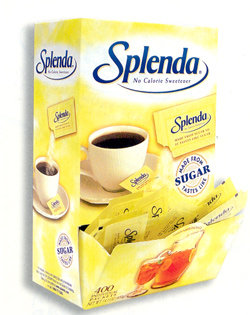Upon entering, we took a hard right into the produce section. Nothing looked too extraordinary, in fact I didn't even see an organic section, but I didn't look too hard because I immediately became distracted by a big brown barrel.....of giant stalks of sugar cane!

What?! Where did these come from and why would anyone want to buy a 7 or 8 foot stalk of sugar cane? I've seen short pieces of sugar cane packaged for sale before, but never sugar cane taller than me. Each stalk was for sale for $2.99. Jeff and I laughed and planned on stopping in to buy some (pure humor factor) on our way out of town, but forgot.
Bloom had a "natural foods" section, basically the same products you'd find at a Whole Foods, so I wandered around there for a minute before perusing the rest of the aisles of the grocery store. On an end cap I noticed a giant yellow bag of sweetener. I'd never heard of it before. "Nevella. No Calorie Sweetener." Hmmm. Of course I was skeptical. I picked up a bag (which weighed as much as a helium balloon) and looked at the ingredients, expecting sucralose, because so far, Splenda and its generic product sucralose, are the only sweeteners that don't weigh a thing.


As you can see, the ingredients are as follows: maltodextrin, sucralose, bacillus coagulans GBI-30-6086
I wouldn't touch this stuff. Why? All above ingredients are manufactured.
MALTODEXTRIN: Let's revisit maltodextrin. It's a product of corn (or wheat, in Europe). It's a food additive produced from corn starch by hydrolysis, into a white powder and is absorbed as quickly as glucose. Basically, it's a sugar you won't find anywhere in nature, and considered a "hidden" sugar. When you look for sugar in an ingredients label, it's easy to pass over this ingredient. (1)
SUCRALOSE: It's 600 times as sweet as table sugar. It is made by chlorinating sugar, and is made up of 50% phenylalanine, 40% aspartic acid, and 10% methyl alcohol. In 1998 it was approved by the US FDA. Then in 2000 safety concerns were raised, including lack of long-term studies. However, according to Wikipedia, "Sucralose is one of two artificial sweeteners ranked as 'safe' by the consumer advocacy group CSPI," not to mention other groups like the USDA, WHO, etc. Personally, I can do without anything artificial. (2)
bacillus coagulans GBI-30-6086: This ingredient was developed by Ganeden Biotech, Inc., who are focused on their probiotic technology. This patented bacteria strain can withstand high temperatures from baking and boiling.
It's interesting how many new sweetener products are on the shelves these days. I can't keep up with them all. However, it seems that most of them contain either sucralose or some product of stevia. Since consumers are demanding "sweet", but "no calories", the market (companies) is supplying that demand. I think artificial sweeteners will be around for a long time....
(1) http://en.wikipedia.org/wiki/Maltodextrin
(2) Get The Sugar Out, p. 56-57

